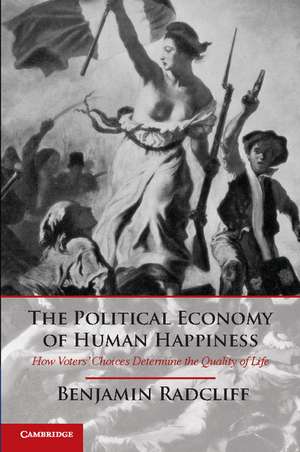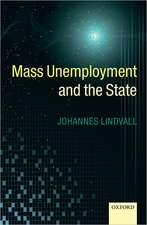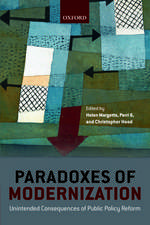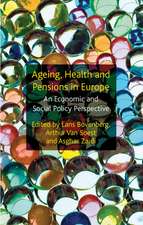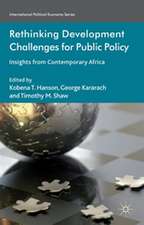The Political Economy of Human Happiness: How Voters' Choices Determine the Quality of Life
Autor Benjamin Radcliffen Limba Engleză Paperback – 24 mar 2013
| Toate formatele și edițiile | Preț | Express |
|---|---|---|
| Paperback (1) | 203.50 lei 6-8 săpt. | |
| Cambridge University Press – 24 mar 2013 | 203.50 lei 6-8 săpt. | |
| Hardback (1) | 552.94 lei 6-8 săpt. | |
| Cambridge University Press – 24 mar 2013 | 552.94 lei 6-8 săpt. |
Preț: 203.50 lei
Nou
Puncte Express: 305
Preț estimativ în valută:
38.94€ • 40.66$ • 32.15£
38.94€ • 40.66$ • 32.15£
Carte tipărită la comandă
Livrare economică 15-29 aprilie
Preluare comenzi: 021 569.72.76
Specificații
ISBN-13: 9781107644427
ISBN-10: 1107644429
Pagini: 214
Ilustrații: 16 b/w illus. 16 tables
Dimensiuni: 155 x 231 x 20 mm
Greutate: 0.36 kg
Ediția:New.
Editura: Cambridge University Press
Colecția Cambridge University Press
Locul publicării:New York, United States
ISBN-10: 1107644429
Pagini: 214
Ilustrații: 16 b/w illus. 16 tables
Dimensiuni: 155 x 231 x 20 mm
Greutate: 0.36 kg
Ediția:New.
Editura: Cambridge University Press
Colecția Cambridge University Press
Locul publicării:New York, United States
Cuprins
1. The democratic pursuit of happiness; 2. Market democracy; 3. Citizens or market participants?; 4. The scientific study of happiness; 5. The size of the state; 6. Labor unions and economic regulation; 7. The American states; 8. Between market and morality.
Recenzii
'A growing number of social scientists and policy makers are starting to explore the implications for public policy of the newly emerging measures of happiness. I highly recommend for their consideration this pathbreaking, scholarly, and judicious work.' Richard A. Easterlin, University of Southern California
'One of the most intellectually sophisticated, empirically convincing, and politically relevant books I have read in years. Radcliff's central conclusion - that the principal determinant of the quality of human life is the degree to which public policies empower citizens against the arbitrary power of the market - could hardly be more compelling or more persuasively argued.' Alex Pacek, Texas A & M University
'This is a splendid and very courageous book. Based on an unusually impressive amount of high-quality data and using sophisticated analytical techniques, Benjamin Radcliff succeeds in answering a question that few of his colleagues have dared to pose: What type of public policies creates and increases human well-being? The answer is as profound as it is radical. In a time when the relevance of political science is under attack, this book is the answer.' Bo Rothstein, August Röhss Chair in Political Science, University of Gothenburg
'We will never agree on matters of ideological taste, but we can agree on facts. This book demonstrates how facts about happiness can be used in the ongoing debate on the welfare state. Although it may not tell the last word, it shows the way to evidence-based consensus building.' Ruut Veenhoven, Emeritus Professor, Erasmus University Rotterdam
'[T]he book provides an eloquent demonstration of how a fundamental departure in the objectives of government - aiming for meaningful and happy lives for the greatest number of citizens - underlies the origins of public policy in the United States and in modern social democracies more generally. It also shows the new tools that well-being metrics provide to assess how well different governments are doing in meeting that objective. The book is a worthwhile read for scholars and students of economics, political science, philosophy, and public policy.' Carol Graham, Journal of Economic Literature
'In The Political Economy of Human Happiness, Benjamin Radcliff poses a fundamental question for politics and political science: 'what specific public policies contribute to better lives?'. His immodest aspiration of providing 'an objective, empirical answer to this question' will rightly warm the hearts of those who see political science as a tool for social progress rather than a mere collection of intellectual puzzles.' Larry M. Bartels, European Political Science
'One of the most intellectually sophisticated, empirically convincing, and politically relevant books I have read in years. Radcliff's central conclusion - that the principal determinant of the quality of human life is the degree to which public policies empower citizens against the arbitrary power of the market - could hardly be more compelling or more persuasively argued.' Alex Pacek, Texas A & M University
'This is a splendid and very courageous book. Based on an unusually impressive amount of high-quality data and using sophisticated analytical techniques, Benjamin Radcliff succeeds in answering a question that few of his colleagues have dared to pose: What type of public policies creates and increases human well-being? The answer is as profound as it is radical. In a time when the relevance of political science is under attack, this book is the answer.' Bo Rothstein, August Röhss Chair in Political Science, University of Gothenburg
'We will never agree on matters of ideological taste, but we can agree on facts. This book demonstrates how facts about happiness can be used in the ongoing debate on the welfare state. Although it may not tell the last word, it shows the way to evidence-based consensus building.' Ruut Veenhoven, Emeritus Professor, Erasmus University Rotterdam
'[T]he book provides an eloquent demonstration of how a fundamental departure in the objectives of government - aiming for meaningful and happy lives for the greatest number of citizens - underlies the origins of public policy in the United States and in modern social democracies more generally. It also shows the new tools that well-being metrics provide to assess how well different governments are doing in meeting that objective. The book is a worthwhile read for scholars and students of economics, political science, philosophy, and public policy.' Carol Graham, Journal of Economic Literature
'In The Political Economy of Human Happiness, Benjamin Radcliff poses a fundamental question for politics and political science: 'what specific public policies contribute to better lives?'. His immodest aspiration of providing 'an objective, empirical answer to this question' will rightly warm the hearts of those who see political science as a tool for social progress rather than a mere collection of intellectual puzzles.' Larry M. Bartels, European Political Science
Notă biografică
Descriere
Radcliff examines the question of how political outcomes in democratic societies determine the quality of life that citizens experience.
